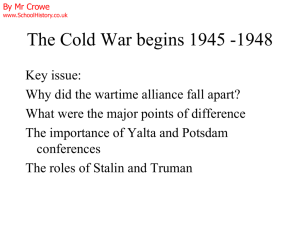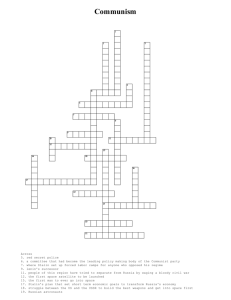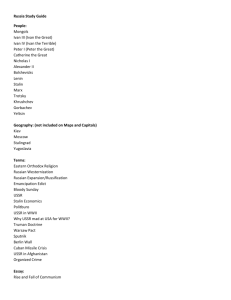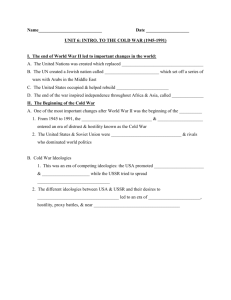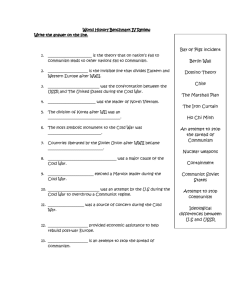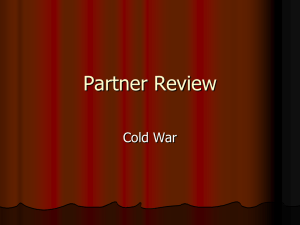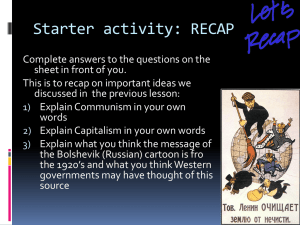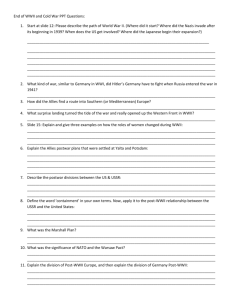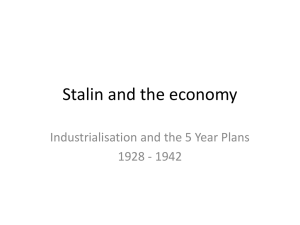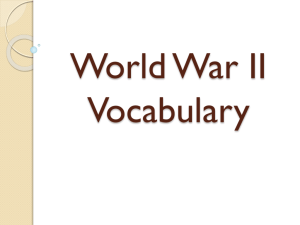Essay 1- WWII Cause of Cold War
advertisement
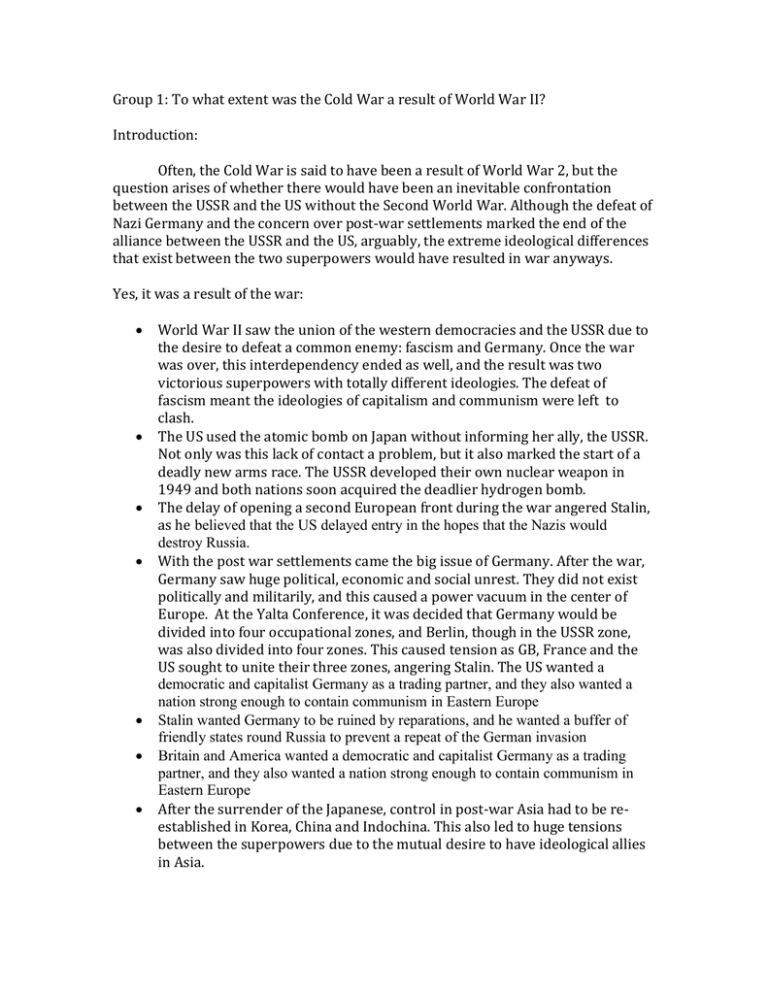
Group 1: To what extent was the Cold War a result of World War II? Introduction: Often, the Cold War is said to have been a result of World War 2, but the question arises of whether there would have been an inevitable confrontation between the USSR and the US without the Second World War. Although the defeat of Nazi Germany and the concern over post-war settlements marked the end of the alliance between the USSR and the US, arguably, the extreme ideological differences that exist between the two superpowers would have resulted in war anyways. Yes, it was a result of the war: World War II saw the union of the western democracies and the USSR due to the desire to defeat a common enemy: fascism and Germany. Once the war was over, this interdependency ended as well, and the result was two victorious superpowers with totally different ideologies. The defeat of fascism meant the ideologies of capitalism and communism were left to clash. The US used the atomic bomb on Japan without informing her ally, the USSR. Not only was this lack of contact a problem, but it also marked the start of a deadly new arms race. The USSR developed their own nuclear weapon in 1949 and both nations soon acquired the deadlier hydrogen bomb. The delay of opening a second European front during the war angered Stalin, as he believed that the US delayed entry in the hopes that the Nazis would destroy Russia. With the post war settlements came the big issue of Germany. After the war, Germany saw huge political, economic and social unrest. They did not exist politically and militarily, and this caused a power vacuum in the center of Europe. At the Yalta Conference, it was decided that Germany would be divided into four occupational zones, and Berlin, though in the USSR zone, was also divided into four zones. This caused tension as GB, France and the US sought to unite their three zones, angering Stalin. The US wanted a democratic and capitalist Germany as a trading partner, and they also wanted a nation strong enough to contain communism in Eastern Europe Stalin wanted Germany to be ruined by reparations, and he wanted a buffer of friendly states round Russia to prevent a repeat of the German invasion Britain and America wanted a democratic and capitalist Germany as a trading partner, and they also wanted a nation strong enough to contain communism in Eastern Europe After the surrender of the Japanese, control in post-war Asia had to be reestablished in Korea, China and Indochina. This also led to huge tensions between the superpowers due to the mutual desire to have ideological allies in Asia. US policy of containment and economic aid to struggling European nations (Truman Doctrine and Marshall Plan) were considered to be economic imperialism and Stalin believed they were trying to buy their way into European affairs No, the Cold War was not a result of the war: The Russian Civil war of 1918-1921 saw the rise of communism in the USSR. Following the Bolshevik revolution in Russia, the US became hostile towards the nation. The US also sent covert military and financial aid to the white army, an enemy of the Bolsheviks. There was a "Red Scare" in the U.S. in the late teens and early twenties (1918- 1925). When Stalin came into power in 1924, the mistrust intensified, so tensions existed before WWII The extreme ideological differences between the two superpowers would have eventually resulted in confrontation. It is inevitable that the two powers were going to face off in the future. The USA was a capitalist democracy vs. the USSR’s communist dictatorship. Communism's primary goal was to bring down capitalism through any means possible and communism was a huge threat to a free world with free markets. Both sides believed that their ideologies were the key to the future happiness of the human race. Orthodox historians: The Marxist Leninist system would have challenged the free world without WWII. The USSR wished to liberate oppressed workers in capitalist nations and the US wished to liberate nations from oppressive communist rule Post revisionists: Nuclear tension- Both nations had already been developing nuclear weaponry before WWII. Both superpowers lived in a constant state of insecurity and fear due to the concept of mutually assured destruction. Though historians remain divided on the extent of which the Cold War was a result of World War II, it is realistic to believe that there would have been tensions between the USSR and the US without the war. WWII did aggravate the situation by creating problems that led to even more differences between the nations, but ultimately, WWII only halted hostilities due to the desire to defeat a common enemy. The differences in ideology were so stark, that the Cold War between the two superpowers was inevitable. To what extent was the Cold War a result of WWII? Intro: World War II ended with the US and the USSR as the only remaining world superpowers. The ravaged post WWII Europe provided perfect conditions for imperialism by other countries; the war created two superpowers with polarizing ideals. After their alliance broke, the ideals of communism and capitalism turned on each other in an effort to control the influence in Europe. Body Paragraph #1: It was a result - - Use of the atomic bomb against Japan o Intended to scare the USSR o Didn’t inform Russia of its creation o At that point in time, Russia had not created any atomic weapons Division of the defeated Axis is difficult o Korea, China and Indochina must be divided o Germany had to be divided among west/USSR World War II espionage results in fear/McCarthyism o Espionage was seen as the reason for paranoia, Mao’s rise, and the Russian a-bomb The US flourished, USSR had been devastated o US didn’t come to the USSR’s aid by opening a useful second front, they allow the USSR to continue to shoulder the heavy casualties The shambles of post WWII were perfect conditions for imperialism o Directly leads to Marshall Plan for containment, Stalin sees this as a violation of his ideals Historiography: Revisionist: Both sides are at fault since the alliance broke after WWII due to their differences. Concessions after the war were not made on both sides, which helped to fuel the Cold War tensions Body Paragraph #2: It wasn’t a result - Capitalism and Communism can’t coexist Security Dilemmas o Once the two sides have been formed, it is inevitable that one will make a threatening move. The other is forced to act accordingly. Communism vs. Capitalism was unstable from the beginning o Already occurred with US support of White Army, clashing ideologies Soviet pressures at home o As Kennan wrote in the Long Telegram, the Soviet leaders were forced into decisions and attitudes that weren’t always beneficial Historiography: Post Revisionist – most of the Cold War was a result of fear that resulted from atomic weapons. WWII was not the beginning of the search for nuclear weapons, nor was it the first time that communism and capitalism had clashed. Orthodox: the communists would have tried to liberate oppressed capitalist workers even if WWII hadn’t happened; the clashing of ideologies was inevitable Closing: World War II left the post war world in a state ripe for the imperialism and influence from the remaining superpowers. Since the two superpowers had ideologies incapable of coexisting, it was inevitable that they would eventually come into contact. However, World War II created and heightened tensions among the US and USSR that assured the beginning of the Cold War.
